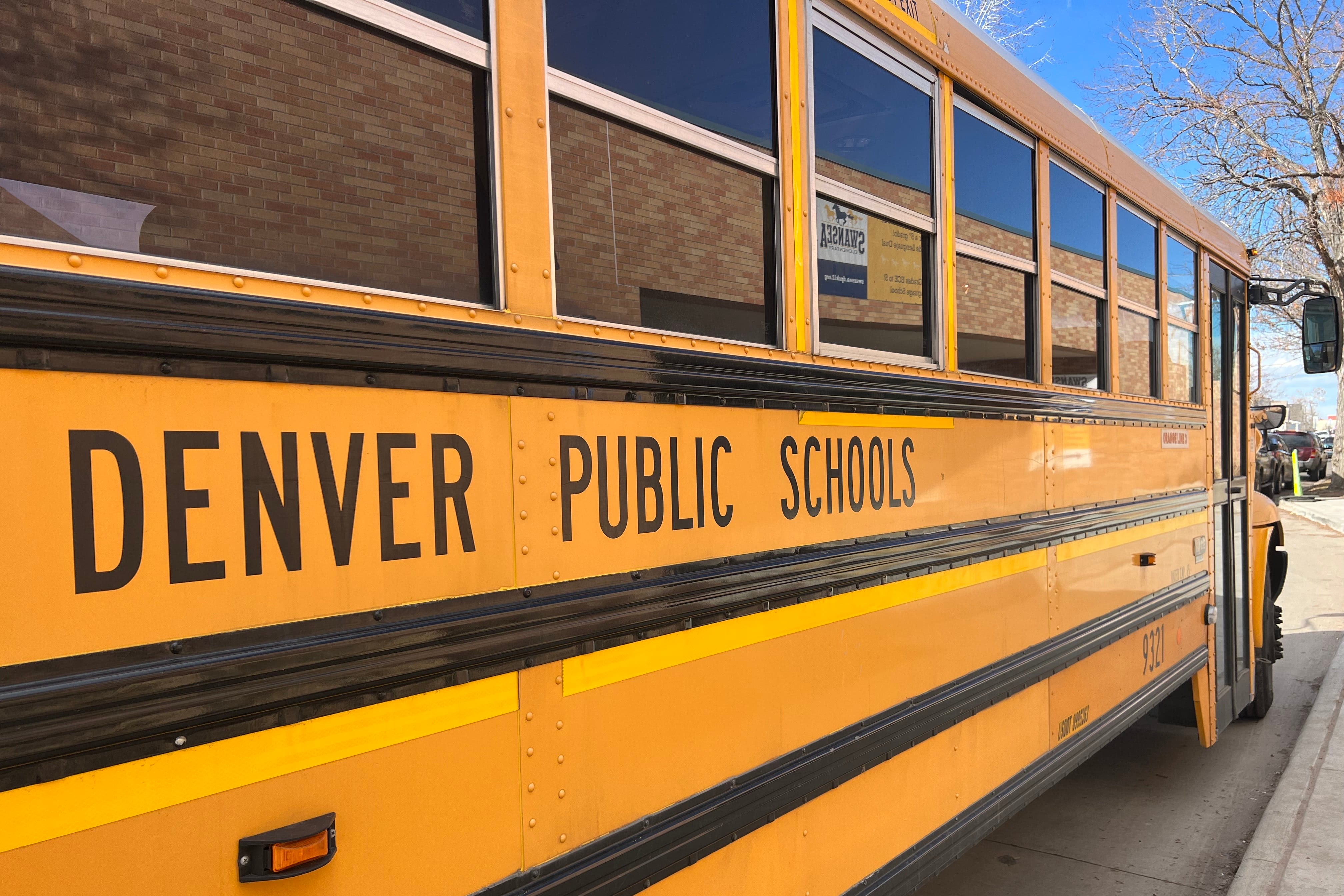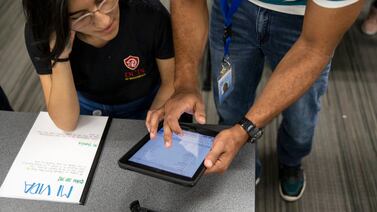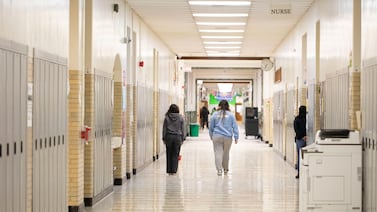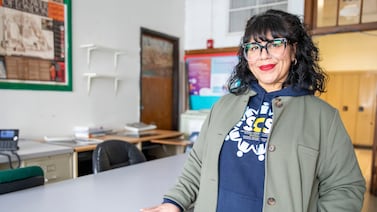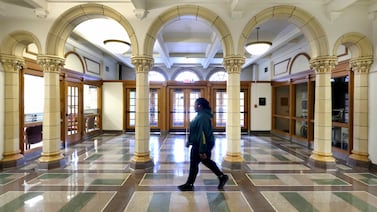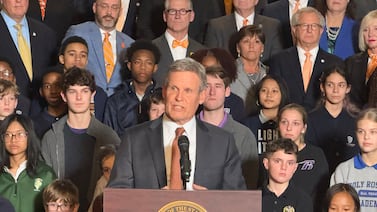Sign up for Chalkbeat Colorado’s free daily newsletter to get the latest reporting from us, plus curated news from other Colorado outlets, delivered to your inbox.
When Denver Superintendent Alex Marrero was invited to a panel by the government of the Dominican Republic last year to showcase the school district’s approach to bilingual education, he said dozens of teachers there asked him how they could work for him.
Marrero said he came back to Denver excited that he may have helped recruit 30 new teachers to fill bilingual teaching vacancies. But despite their enthusiasm, only a handful of those teachers are now working in Denver Public Schools, he said.
Marrero asked the district’s human resources team to look into why. Many teachers said they felt making the switch was a big risk and they didn’t have enough support, Marrero said.
So this school year, Denver Public Schools launched the International Educators Institute to provide not only professional, but also personal support to new international teachers. The institute will help teachers from other countries figure out where to live, understand finances and credit, and provide other social or emotional support. It will also train teachers to help them earn more credentials and to understand how Denver’s school system works.
Denver Public Schools has enrolled thousands of new students who have recently immigrated from South America. Although the International Educators Institute wasn’t created because of that influx of students, it makes the work more important, Marrero said. In addition, the district is under a court order guiding how it teaches students who aren’t yet fluent in English. Meeting that order requires a large number of bilingual teachers, but there are always vacancies.
Marrero said the work of the institute is to help fill teacher vacancies without replacing existing efforts to fill those jobs.
Denver Public Schools serves 88,200 students, 75% of whom are students of color. But among the more than 6,000 teachers, just about a third are teachers of color. If the institute is successful, he envisions a system where students have more teachers of color, and teachers can expand their careers and better their lives.
If they have to go back to their home countries, they can better help more children around the world too, he said.
“That’s what hasn’t existed ever,” Marrero said of the institute. “Just like we say we have to educate the whole student, it’s the same approach. The parallel is that we have to support the whole educator.”
To get the institute started, Marrero said DPS used $500,000 from federal COVID relief money. But the district will also invest at least $1 million from its general fund.
“We would waste way more in guest teachers, substitute coverage throughout the year, so the way I see it, that’s an investment,” Marrero said.
International teachers struggle without support
Maria Moncada Rodriguez, an international teacher from Honduras, has been in Colorado for four years, but is working in Denver schools for the first time this school year.
She said she has loved the support from her colleagues and from the institute and wished she had more of it when she initially arrived in the U.S. to work in a different school district.
Moncada Rodriguez and her husband were teachers in Honduras who ran a Montessori school for more than 20 years. But as violence in the country increased, she sought a way out. Then she won a contest that allowed her the opportunity to come teach in Colorado.
She and her husband were both supposed to get jobs, and her two children would be able to come along. But at the last minute, a new principal took over the Colorado school where she was supposed to teach and rescinded her husband’s job offer.
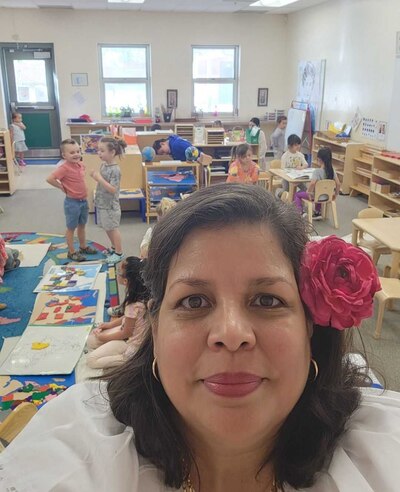
While her family still joined her in Colorado, it took her husband more than a year and a half to get a work permit. And during that time, Moncada Rodriguez said the family struggled financially with just her income.
“We cried almost every day,” she recalled. But she said she and her husband still gave thanks that their children were in a safe home.
But now that she’s working in Denver Public Schools, she’s been able to connect to other international teachers from various countries, through the institute, and also through the teachers union.
Recently, she said she and the other international teachers she’s met decided to start a guide for newly arrived teachers. Ideally, she said it would include information on clothing drives, financial literacy classes, help with buying a home, immigration lawyers, and more.
“We need all types of information,” she said.
It’s the same kind of help the district’s institute wants to provide.
Denver’s goal: 120 new international teachers next year
As the district has rolled out the supports and launched the institute this year, it’s also hired 64 new visa sponsored teachers for the current school year. That’s brought the total of international teachers with work visas in DPS to 234. For next school year, the district’s goal is to hire 120 new international teachers.
The district plans to use some of the institute’s $1.5 million budget on visits to other countries to help recruit and connect with teachers, but also to help staff to spend time finding resources and helping new teachers.
Finding affordable housing for teachers is a particularly important issue, but Marrero said he’s not interested in being a landlord or managing property.
“There is a healthy way to engage, but there’s also a lot to be said when you have a little bit of separation,” Marrero said. Teachers, he said, “don’t want to be under the DPS thumb.”
Still, the district is exploring relationships with developers, landlords, and city officials. This year, for example, the district was able to negotiate a lower price on a long-term lease for some teachers from the Dominican Republic.
“That’s going to be us leveraging our existing relationships and leveraging also our position,” Marrero said. “Even if it’s just a building. Saying: ‘Can we have X amount of units that we have first dibs on?’ That’s what I’m looking to explore.”
Moncada Rodriguez continues to look for resources on her own. One issue she hasn’t figured out is how to help her oldest child, who’s graduating this year, pay for college. Since her children are her dependents and she is on a sponsored visa, they can’t get work permits, and they don’t qualify for any of the financial assistance for higher education she’s learned about so far.
“Of course we aren’t asking for everything to come easy or handed to us,” Moncada Rodriguez said. “We love to work and study. But coming here and knowing our kids can’t go to university because of a lack of resources is overwhelming.”
Still, she wants other teachers considering coming to the United States to know that things can get better if they can persist. And she hopes local leaders can learn to be more supportive too.
At her school, Academia Ana Marie Sandoval, she loves that she gets to use her experience as a Montessori teacher working with students from low-income families, and that she’s valued for her Spanish language skills.
She said her fellow teachers have been helpful and supportive, and her connection to the institute means there’s always someone to answer her questions.
Moncada Rodriguez said she’s taken many Denver Public Schools training courses, including one that’s taught her how to do home visits with families of newly arriving migrant students.
“Now the only thing missing is how to get a masters degree,” she said. “I’m working on that next.”
Yesenia Robles is a reporter for Chalkbeat Colorado covering K-12 school districts and multilingual education. Contact Yesenia at yrobles@chalkbeat.org.

